► Follow our entry into Radical’s SR1 Cup championship
► Lightweight SR1 packs a 185bhp Suzuki Hayabusa engine
► Full diary of how CAR’s James Taylor won the 2016 SR1 Cup title
Could this be the quickest long-termer CAR has ever run? In all of this magazine’s very many years there’s surely been none lower, none lighter and none capable of higher G forces than this one – the Radical SR1.
For 2016, we welcomed a full-on racing car to the fleet as CAR magazine campaigned in the Radical SR1 Cup championship, with staff writer James Taylor at the wheel – and the season went rather well!
Read James’s season diary in full here, with the most recent reports, videos and updates added from the top.
Radical SR1 Cup 2016 race diary: epilogue
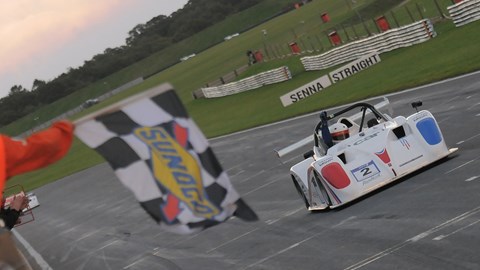
Here’s a sentence I didn’t dare believe I’d be writing when our Radical adventure began: I am officially the 2016 SR1 Cup champion. Crikey.
After a season with eight races, three poles, two wins and one lap record, CAR’s SR1 and I crossed the Snetterton finish line under a hazy sunset with enough points banked to take the 2016 title.
I owe a huge debt of thanks to all at Radical, and to all of the SR1 competitors, who were incredibly welcoming, friendly and supportive. The SR1 Cup paddock is a very nice place to be.
This has been an atypical long-term review, of course, but the acid test remains the same: would I spend my own money (if I had it) on the SR1 Cup, or recommend that someone else should? Oh, without a doubt. A Porsche 911 or a Radical SR1/trailer/nice tow car combo? No contest. As I’ve been telling anyone who’ll listen, the SR1 is the most fun thing I’ve ever driven, and to race one over a full season has been a rare privilege indelibly scribed into my memory banks.
Although the £45,000 package for a new SR1 in 2016 includes a racesuit, licence test, race entries and two (extremely helpful) pre-season training days, you’d need extra for further testing, and the majority of competitors budget for teams to run them rather than maintain the car themselves. I was fortunate to be run by the Radical UK Works Team, who also transported the car for me. Were the theoretical running costs in the logbook below to be completely representative of my season, they’d also include fees for new rear tyres halfway through the season (we raced on the same fronts all year, and tested on old tyres), two trackdays, four MSVR testdays and numerous auxiliary maintenance costs.
Taking on a full season is no small commitment then, but for such a high-quality, high-speed championship (the fastest novice championship in the UK), the SR1 Cup really does demand as little time and money from competitors as is practically possible. If you’re thinking about trying an SR1, you must do it.
Its tail-happy handling is hugely entertaining, and also a challenge to control neatly over a race distance. That same liveliness that’s so captivating at first eventually becomes a frustration, and by season’s end you’ll likely find yourself craving a bit less oversteer and even higher cornering speeds. At which point Radical, naturally, might point you towards the next rung on its racing ladder, the SR1’s bigger, grippier SR3 sibling.
Meanwhile, I’m still trying to work out whether this season was real, or just another racing daydream: a podium in every race and, unexpectedly, the first driver to win the SR1 Cup in their first season since the championship’s inaugural year in 2013. It’s been an unforgettable experience, tempered only by the realisation that life is about to feel very empty indeed.
By James Taylor
Logbook: Radical SR1
Engine: 1340cc 16v 4-cyl, 185bhp @ 9200rpm, 108lb ft @ 7000rpm
Transmission: Six-speed sequential, limited-slip differential, chain drive, rwd
Stats: 3.6sec 0-60mph, 138mph, n/a CO2
Price £45,000 As tested £50,630
Miles this month 128 Total miles 964
Extra costs £618 (replacement rear wing assembly, new visor, extra racewear)
Radical SR1 Cup 2016 race diary: Round 4 at Snetterton – the championship finale
After countless laps, two wins and some unforgettable memories, it’s time to say goodbye to what is surely the most exciting long-termer I’ll ever run. But first there’s the small business of the final round of the championship to survive. I go into the final three races at Snetterton’s 300 circuit with a 38-point lead, so in theory I just need three solid finishes to scoop the trophy, which would be something of a coup – apart from the championship’s inaugural season in 2013, no driver has won the SR1 Cup in their first year.
Thing is, eight hours before crossing the finish line in that final race, I’m beached in the gravel trap at the first corner. Not an ideal start.
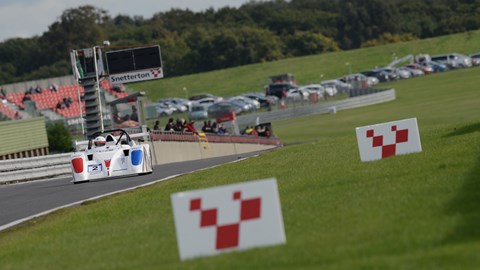
After a conveniently timed downpour early in the morning, qualifying starts wet, but with a cold and slippery track surface becoming gradually less so on every lap. Times tumble every lap as we slither around; I see P1 on my pitboard briefly, then P2. We know the final lap of the qualifying session would be the driest and therefore the fastest, so I have to push.
Too hard as it turns out – carrying as much speed as I dare into the dauntingly fast Riches bend turns out to be a risk too far, as the SR1 swaps ends on the still-damp surface and ends up beached up to its axles in gravel. Just in time for the chequered flag to fall. Oops.
Snetterton’s marshalls tow me out, minus one of the SR1’s sideskirts, and I’m able to drive back to the paddock with the car otherwise undamaged. Missing the crucial last lap is a blow, but happily my times from earlier in the session still put me third and second on the grid for the opening two races of the day. The third and final race will be a replay of the abandoned race at Cadwell Park earlier in the season (see the diary report below), for which I’ll be starting P2.
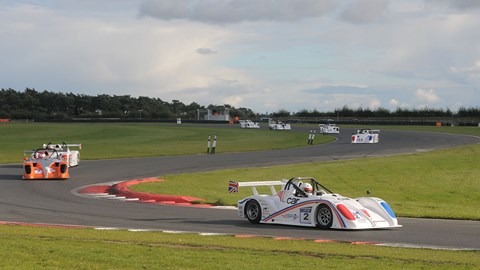
Oliver Barker, who has been tremendously fast all season, starts on pole alongside Oulton Park race-winner Kye Wheatley. Oliver could still catch me in the championship if I pick up any poor results, so it’s crucial that I finish every race, and do so as high up the field as possible.
All three of us make a good start and end up running very close together in the opening lap, each being very careful not to trip over one another. I get a good run out of the opening lap’s final corner and pass Kye, who then has his hands full battling the rest of the field, so I end up finishing in a comfortable second place behind Oliver, with Richard Baxter further back in third. Phew. One race down, two more to survive now.
You can watch Race 1 in full on the RadicalTV YouTube channel below.
What’s the Snetterton 300 circuit like to drive? It’s a mix of extremely fast bits, and tight, technical complexes. Fastest of the lot is turn one, Riches, which I can’t quite bring myself to attack wholeheartedly with so many points at stake, for fear of taking a trip into the cabbage field that lies in wait just beyond its high-speed exit.
Snett can also boast the longest straight in British motorsport, and apart from stretching the SR1’s legs it’s also doing the same to my crash helmet’s straps. There’s no windscreen in the SR1, and halfway down the straight aerodynamic lift drags my lid upwards, as if it’s trying to remove it from my head. Not long before the race I’d been reading Mark Webber’s autobiography, in which he mentions the tiny aero screens on Adrian Newey’s Red Bull F1 cars giving him the same problem, but which he’d solved by opening his mouth wide on the straights. I try that, but find it even more distracting than the helmet lift in the first place, so settle for quickly tightening the helmet’s strap at the start of the straight. The lap closes with the tricky Coram curve, which requires a spot of braking, downshifting and turning, all at the same time. Enough to keep you busy then.

Race two, this time from the front row. I get a great start and lead the first few laps, before Oliver gets past into the Wilson hairpin. I don’t fight him, let him get on with it, and finish a safe second again. This is becoming very real; if the Radical team’s sums are right, I only need to finish 7th or higher in the final race to win the championship.
So, here goes. The final race is the very last one of the day, starting late enough to be bathed in an orange sunset. Handshakes and bear hugs all round with the other drivers, and then we head to the grid for the final time. It would be an emotional moment if I wasn’t concentrating so hard on the start.
The lights go out, I make one of the best starts I’ve managed all year and again lead the opening lap, but it’s not long before Oliver Barker draws alongside into Riches. Again I don’t fight him and expect him to clear off up the road, but this time he does the opposite and deliberately slows his car at strategic points on the circuit to back me up into the path of third-place man Richard Baxter. This potentially places me in a worrying position; if Richard and I tangle, the championship is lost.
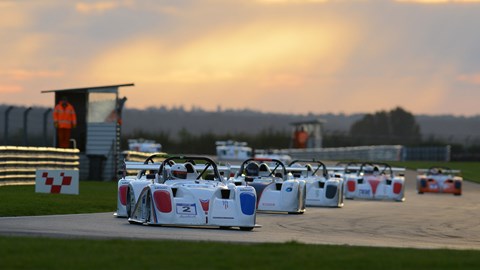
Given that I only need to finish 7th to take the title, I seriously consider backing right off and letting the two of them get away but brave it out, positioning my car as safely as I can for several laps in close company before we eventually spread out into clear air.
That leaves me in a relatively safe bubble on my own for the last few laps, and I try to enjoy them as much as possible, consciously soaking into my memory the last few moments of an experience I’ve been very lucky to have.
Then it’s the chequered flag, and a breathless whirlwind of photos, interviews and a thorough soaking in champagne from Richard and Oliver on the podium.
You can watch Race 3 below:
The SR1 Cup has been a fantastic championship to be a part of. As a complete hand-holding journey for any novice to intermediate driver, it’s a thorough package: the pre-season training days offer an invaluable chance to get to grips with the car and the rules, to practice race starts and with advice on hand from professional drivers; the racing is hard-fought and close but fair; the staff and competitors in the series are incredibly friendly and welcoming; and of course the SR1 itself is pretty special. It’s a challenging, enthralling car to master, it’s seriously fast (no other novice series can offer lap times this fast) and I still feel it’s the most fun car I’ve ever driven.
At this point I owe a few sincere thank yous: to CAR magazine for allowing me to embark on the SR1 long-termer project, to Radical SR1 Cup co-ordinators Roger Green and Will Brown for letting me join the championship and doing a stellar job of running it, and to everyone at the Radical UK Works team, in particular George, Tom, Reese and Rob, for their superb work running the car at each round, and to Oliver Read for his spectacular photographs.
And most of all, to all of the other competitors in the 2016 SR1 Cup for being so friendly, welcoming and supportive. I can’t recommend joining them enough.
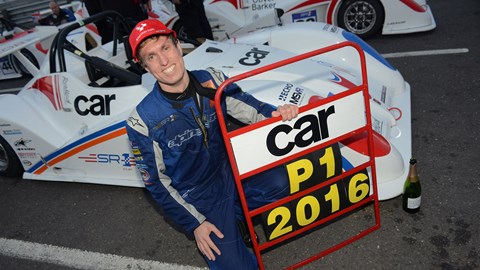
Radical SR1 Cup 2016 race diary: Round 3 at Cadwell Park
On reflection, stuffing the SR1 nose-first into the barriers (see below for details) the day before race day probably wasn’t ideal preparation for combat at one of the UK’s most challenging circuits.
The (fortunately) relatively minor shunt was a reminder that if you get complacent on this most thrillingly old-school of tracks, the smallest of mistakes can be swiftly punished. With protecting the championship lead at the forefront of my thoughts, I entered qualifying in a cautious frame of mind.
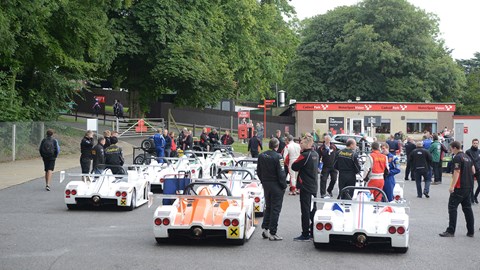
A flying lap of Cadwell is a game of two halves. The first section is fast, flowing and spread out, like a length of rope loosely thrown across a hillside field. Then, after a yump over the infamous Mountain section, the track plunges into the woods to reach a tight, fiddly conclusion.
It’s as exhilarating as it is narrow and technical, and after a slightly circumspect approach to a qualifying session interrupted by a red flag, I wind up second-fastest to the less inhibited Oliver Barker, who is well-tuned into the circuit and pushing hard. No sooner than qualifying’s finished, the rain begins to fall. We’d been prepared for it; the relentlessly gloomy forecast says it’ll last all afternoon, and by the time race time comes the rain is borderline torrential.
To keep costs manageable, SR1 Cup regulations limit drivers to two sets of race tyres for a season. Our fronts are still looking healthy at this halfway point, and after a damp Oulton Park the rears aren’t looking two bad either, but hoping to eke out maximum grip from the rain-soaked surface we bolt on a fresh set of boots at the back for the first time.
New tyres have a naturally oily surface until scrubbed in, and on the way to the grid, I find myself on full opposite lock at little more than walking pace. Maybe we should have bedded them in the day before…
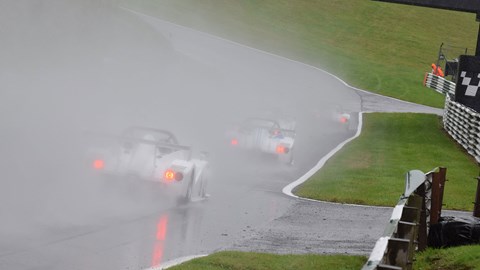
The warm-up laps are an adventure, too. In deference to the change in conditions since qualifying the organisers permit two ‘green flag’ laps rather than the usual one. Within half a lap, my original plan (to have a go at taking the lead around the grippier outside line at Turn One) goes out of the window. My new goal, I decide, needs to be to simply finish the race in one piece.
There’s so much standing water on the back straight that it now has a couple of lake-like chicanes in it, and even though I only have one car ahead of me the spray is so extreme I can’t even see its rain light. If I were able to take one hand off the wheel, I doubt I’d see it in front of my face. Heaven knows what it’s like further back in the pack with a whole bunch of cars ahead…
Start time. Here goes. As the lights go out, I get too much wheelspin, so I back off and try to short-shift into second gear, but since the paddleshift’s wired to engage only if you’re still on the throttle, end up staying in first. Oops. Meanwhile Oliver’s made a similarly slow getaway, and we’re swamped by the fast starting Rob Ellice and Kye Wheatley from the rows behind.
Then, disaster strikes: as Ellice’s car hits standing water, it twitches to the right; as Barker’s car hits it, it twitches to the left, and an unfortunate touch sends the luckless Ellice into the barriers, the resultant impact bending his chassis beyond repair. It’s terrible fortune for Rob, one of my teammates for the weekend in the factory Radical team. You can watch the accident in the video below, recorded by Driver61.com’s Richard Baxter.
The race is restarted, this time behind the safety car. As it peels off into the pitlane, I chase Oliver down the start/finish straight and get a shock as I feel the car aquaplaning before I even cross the startline. With so little weight and relatively shallow grooves in its tyres, the SR1 isn’t a fan of standing water.
Behind me, Sam Moores isn’t so lucky – as the same water that triggered the accident at the original start sends him into a scary ride along the top of the guardrail, coming to a halt before being collected by Peter Brookes, rotating on the same water. Another two thoroughly nice competitors in the wrong place at the wrong time.
Red flags fly again, and this time the decision is taken not to restart the race; the conditions are just too poor. It’s undoubtedly the right one; although at the time I felt eager to race on, the chances of a crash happening again are unquestionably high, and nobody came here to get hurt.
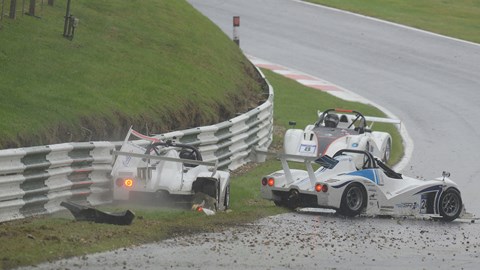
With the rain unrelenting, and yet more shunts in the supporting Mini Challenge races pushing the schedule back towards the evening gloom, it seems doubtful the second SR1 race will run either. Just as I begin packing up to go home, the tannoy crackles: ‘all Radical SR1 Cup competitors to the assembly area.’ We’re racing.
Even though it’s been raining constantly, the green-flag lap reveals that somehow, inexplicably, the track has improved. There are still several treacherous patches of standing water, but they’re smaller than before, and easier to spot. Conditions are good enough to allow us a regular standing start, and this time I make a better fist of it, with a second phase fast enough to have a go at the inside on the approach for turn one.
Which, it turns out, is an error; Oliver Barker sees me coming and, quite reasonably, covers the line to block me. This allows Kye Wheatley around my outside at Turn One into second place – on the very line I’d planned to take in Race One.
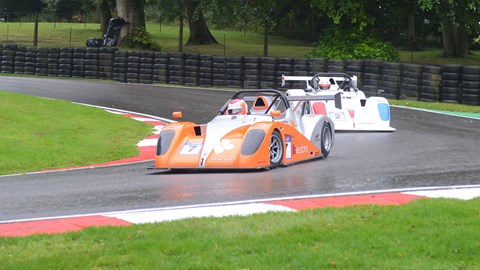
Above all else, I need to finish the race and pick up a decent haul of points, so I stay close enough to Kye during the race to be able to capitalise if he makes a mistake, but don’t risk venturing off the safe line into the standing water to have a go at getting past. Barker wins, Wheatley’s second and I’m a safe third.
Not the most heroic of drives, then, but hopefully a wise one. Heading into the final round at Snetterton I have a 38-point championship lead, but with the abandoned race from Cadwell set to be re-run there’ll be three races instead of two, which means there’ll be more than 120 points on offer. And, as the Cadwell round has so clearly demonstrated, anything can happen…
By James Taylor
Photography by Oliver Read
Radical SR1 Cup 2016 race diary – September: crashing at Cadwell Park. Oops…
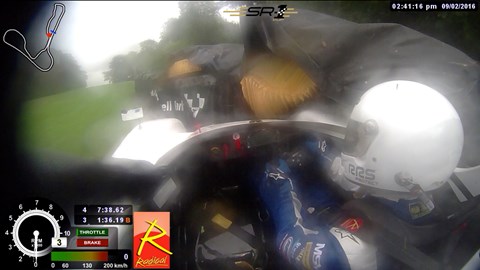
I suppose it was bound to happen sooner or later. You don’t know where the limit is until you go over it, as the saying goes. So, our long-term review of the Radical SR1 is now thorough enough to include a crash test.
Thus far, I’d been feeling rather smug about avoiding any offs in all of the flat-out laps I’d done in our SR1. Not even a spin. On the Friday test day before round three of the SR1 Cup at Cadwell Park, that changed.
Cadwell Park is a very special place, and an equally unforgiving one, that’s draped across a shallow valley in leafy rural Lincolnshire. It’s very much a park circuit from the old school: blind crests, fearsomely quick curves and a refreshing/focusing lack of gravel traps.
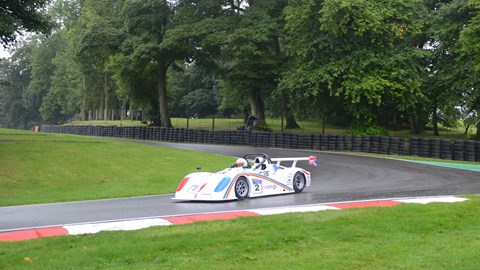
Paradoxically (or perhaps inevitably) for a circuit with high stakes and a heavy bravery requirement, it’s a mecca for motorcyclists – in no small part thanks to the infamous Cadwell ‘Mountain’, a yump where the fastest cars, and especially bikes, get plenty of fresh air under their tyres. Have a look at Josh Brookes’ and Jonny Rea’s erstwhile British Superbike exploits on YouTube to get an idea; and don’t watch Leon Camier’s 2007 crash there unless you’ve got a strong stomach.
Back in April, Cadwell was the venue for the second of the SR1 Cup’s two pre-season practice days – which were designed for us to learn the ropes, practice starts and make friends ahead of the first race. You could tell it was a less forgiving track than most by the stern morning briefing, with Le Mans winner Andy Wallace (a regular Radical instructor and driver coach) imploring us to build up slowly – it’s a track that can bite, and punish the smallest mistakes with accidents that don’t fit the crime. And it was raining.
Just as suggested, I built the pace slowly as the track dried and by the end of the day was flinging our SR1 around Cadwell on maximum attack with gleeful abandon on a circuit that seemed made for it. It’s a narrow circuit, Cadwell, and the SR1’s similarly slim dimensions, eager throttle response and even eager-er direction change make it a natural fit. Little wonder its bigger SR3 brother used to hold the outright lap record.
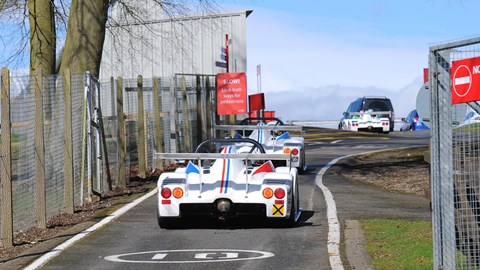
So, returning on a Friday test day before the following day’s race, I was looking forward to attacking the rollercoaster circuit again. I had been building up the pace on a drying track, after a damp start to the day, then backed off to get some clear air after encountering some traffic. This laptime would be irrelevant, I reasoned, so I decided to try something different at the high-speed right-left esses after the Mountain. Normally you’d dab the brakes to settle the car on approach, but since the SR1 has a front axle like a heat-seeking missile, it felt as if it might just be able to roll through on a trailing throttle without touching the brakes.
You can probably guess what happens next. I run out of track and end up on the grass stage right, the damp grass acts as a tractor beam direct to the barriers, and before I can do anything I’m headfirst into them. I remember yelling just before impact, not from fear but from sheer annoyance and embarrassment – and dread that the car must surely be damaged before tomorrow’s race.
Am I ever lucky. The barriers at that particular point are motorcycle-friendly foam blocks, and they do an incredible job. The Radical goes in at a front three-quarter angle, pushing the wing mirror in and then, as the rear of the car slews in to follow, crinkling the rear wing. Yet, as Cadwell’s marshalls and I pull the car from the barriers, it seems a miracle. Either Radical builds incredibly strong front splitters or Cadwell incredibly forgiving barriers, or I’m very jammy. Or all three. I’m able to drive the car back to the paddock and our still-cheerful No.1 mechanic Thomas Jeffery sets about checking it over.
Apart from ingesting a fair amount of grass and a bent splitter support, the front’s fine. The tracking’s not even out. A new wing is sourced, the crimped fibreglass engine cover cajoled back into place, and the car’s good as new in no time. A testament both to the speedy handiwork of Radical’s crew, and the SR1’s neat design.
If you’re ever considering a track day at Cadwell, go for it – it’s an amazing circuit. But just remember the smallest of mistakes really do get punished quickly. No wonder it’s nicknamed the ‘mini-Nurburgring.’
By James Taylor
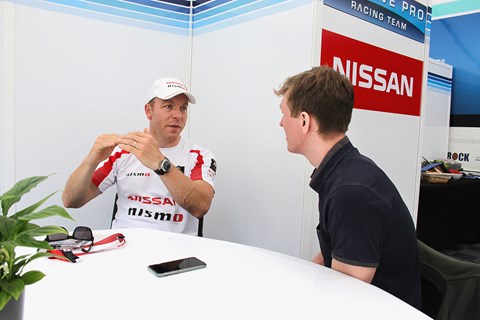
Radical SR1 diary notes: Hoy wonder and the road to Le Mans
In June, we swapped our Radical racer for a Radical road car, and popped off to Le Mans for an audience with a legend.
Our Radical SR1 isn’t road-legal. It has brakelights, but no headlights, and the front splitter might struggle with speedbumps. Radical does make road-legal cars, however, and the flagship is the moderately terrifying-looking RXC Turbo. Powered by a 3.5-litre twin-turbo V6 boosted to 620bhp, it weighs only 900kg and looks like it’s escaped from the grid at Le Mans.
What better way to get to know it properly than to drive a few hundred miles to Le Mans itself for June’s 24 hour race? And we had a good excuse for going – to meet the SR1 Cup’s most famous graduate. Velodrome legend Sir Chris Hoy raced on four wheels for the first time in the SR1 Cup’s inaugural 2013 season, and this year made his debut in the Le Mans 24hrs in an LMP2 prototype. Not a bad trajectory.
The RXC was designed to be a road car just as much as a racing car but, like Jarvis Cocker on a seesaw opposite Meatloaf, the balance does tip somewhat towards the latter. At first, it’s just as intimidating to drive as it looks. The clutch is like a switch, the turning circle makes three-point turns more like 23-point turns, and side vision at junctions is tricky. But once you’re tuned into it, it’s actually very tractable and surprisingly friendly to drive. And ferociously fast.
Heavily trafficked motorways aren’t the best place to explore the RXC’s capabilities, but little squirts on slip roads give a glimpse of the near-apocalyptic performance on offer. It feels easily the fastest car I’ve driven. And the most eye-catching. Every time I return to the RXC there’s a swarm of people encircling it, cameraphones at the ready to capture it start up and pull away (and me stall it, more likely than not).
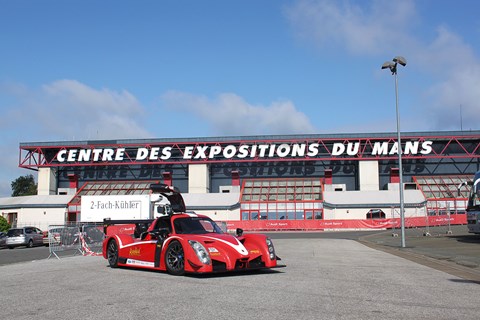
We leave the RXC in the car park with its new fan club, and head for the scrum of the pitlane. Sir Chris greets us with a firm handshake and leads us through the garage past his Ligier-Nissan racer, disassembled like an exploded view as it’s prepped for tomorrow’s race. Appropriately, he then hops onto a bike behind the garage – it’s the only way he can get to the team’s hospitality area without being mobbed for autographs.
Were it not for an introduction to Radical while filming a BBC documentary a little over three years ago, Hoy the cyclist may never have become Hoy the racing driver. ‘I’d always been a motorsport fan and a keen trackday driver but, like most people, I hadn’t considered going racing, other than as a dream. I wouldn’t have known where to begin. Racing in SR1s was a great way into the sport, and taught me so much; reading the car’s balance, learning how to manage the tyres. The LMP2 car really is like a big Radical in the way it handles, the way it conveys information to you.
‘Because the SR1 looks like a mini-prototype racer, it looks like it’s going to be stuck to the ground, but it’s far more like a Caterham to drive – the car’s just, every corner [mimes opposite lock], you’re drifting through and you’re wrecking the rear tyres, they overheat – and it just taught me so much.
‘It took me a bit of time to understand how to get the best out of the car and how not to ruin the tyres like that. If you don’t push, you’re nowhere, and if you push too hard, you just go downhill. But it’s brilliant fun and a great way to get into the sport. Having Andy Wallace and Ian Flux as driver coaches [as part of the SR1 championship package], they’d always talk about stories from Le Mans and they said , “you could get there one day, you know, this is the best place to start.” And I thought “yeah, yeah…” Is it ever going to happen? You don’t want to think that far ahead.’
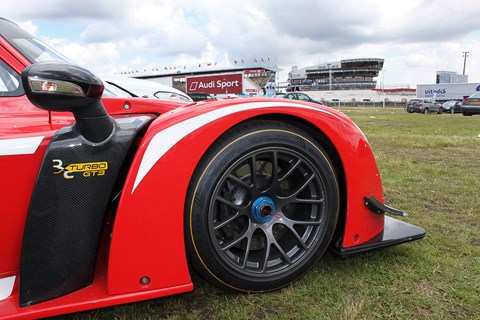
Following the SR1 Cup, Hoy entered the arena of GT racing with backing from Nissan in a GT3-spec GT-R. ‘[Racing in] GTs was the biggest challenge because they were so different. Going from an SR1 to a huge, heavy car, with loads of driver assistance, it’s very different. It was really hard for me to re-learn how to drive that car, I had to almost start from scratch.’ From GTs, Hoy moved to prototypes, winning the LMP3 championship with Ginetta in 2015.
‘Going from the GT3 to the P3, it felt more familiar, being low to the ground, more nimble at changing direction. The car was set up for right-foot braking in LMP3 last year, and in the LMP2 car I’ve had to start left foot braking [because of the shape of the pedalbox]. It’s so much better – I wish I’d done from day one in the SR1.’
‘I’ve got all the on-boards from my SR1 tests and races, and I still love watching them back. Oulton Park, when I spun off and came back through the field, is one of my favourite races even now. And that was just over three years ago.’
As a case study for the SR1 Cup as a training ground goes, novice to Le Mans in less than four seasons is a pretty impressive one. And if you’ve any doubt as to whether Hoy’s legs are still in shape, consider this; Nissan has recently replaced half a dozen broken brake pedals in its simulator…
By James Taylor
Radical SR1 Cup 2016 race diary – July: Round 2 at Oulton Park
After a few weeks’ interlude since Round 1 at Brands, we went to Cheshire for Round 2 at the picturesque Oulton Park. After learning the circuit at a trackday (see last report below), I’ve discovered that it’s a spectacularly exciting track – and also quite a daunting one – which takes some learning and rewards commitment.
To make matters trickier, it’s a cloudy day with not-quite-fully-dry, not-quite-fully-wet conditions forecast throughout. Radical’s Thomas Jeffery, who did sterling work looking after our SR1 at the first round, returns as no.1 mechanic, and Sky Sports F1 presenter Rachel Brookes joins the Radical factory team to race at Oulton as part of a feature for the TV channel, with her colleague and F1 hero Johnny Herbert popping by too.
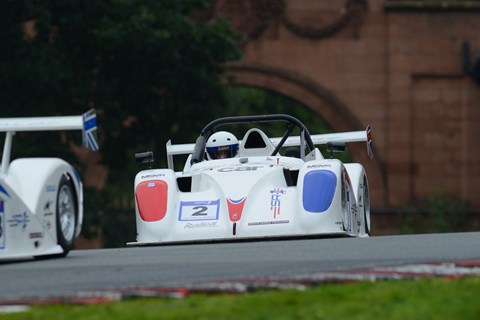
The rain holds off for the start of qualifying, where I take a little too long to clear traffic and get up to speed. Just as the track clears and I start to get on with it, spots of rain begin to hit my visor. Oliver Braker, who showed great pace at Round 1 at Brands, has already set provisional pole and sensibly headed for the pits – no point risking the car as track conditions worsen. Still languishing further down the order, I don’t have any choice but to press on and slither round as best I can. I pass our mechanic Tom’s pitboard and it reads P2, but I’ve no idea how far I am from Barker’s time. The SR1’s digital dashboard readout shows I’m well up on my best dry laptime through the now traffic-free first section of the lap, but the ice rink that was formerly Hislop’s Chicane is costing me more than two seconds at the halfway point. All I can do is dig deep for the first and final sectors of the lap, hoping it makes up for the time I lose in the middle. You’ll be able to watch on on-board video of the lap on this page soon.
I cross the line just as the chequered flag falls, and the dash indicates I’ve beaten my best lap. Somehow I have a funny feeling it might just have been enough for pole. Back in parc fermé, it turns out it was – by just eight thousandths of a second. Oliver shakes his head, grinningly calls me a good-natured unprintable word, and shakes my hand. We’ll be sharing the front row again, just as we did for the opening races at Brands Hatch. But then there’s an unexpected sling of misfortune for Barker as his engine sprocket is found to be the wrong size in scrutineering, an unintentional oversight during engine servicing that forces him to start from the back of the grid for breaching the gearing regulations.
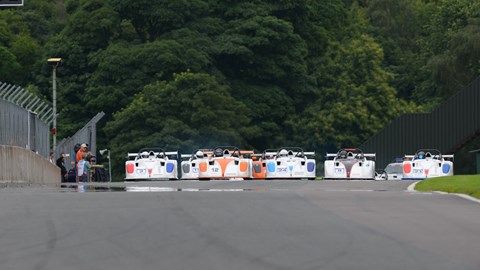
That promotes Richard Baxter to second spot on the grid, and we line up after something of a panicked prelude to the race. The marshalls hurry us into the assembly area earlier than expected, and my mind’s still racing as I roll into the pole slot. The red lights blink on, I raise the revs and then suddenly feel a nagging sense of doubt, for reasons I still don’t fully understand. Is this really the start? Is there a second green flag lap I’ve forgotten about? Are the Oulton lights the same setup as Brands, or are they a different sequence? Why didn’t I think to watch the previous race’s start to find out? The lights go out and I don’t move, still hesitating for fear of a jumped start.
I hear the cars around and behind me drop their collective clutches and their engines scream, and figure I’d better do the same. It’ll probably go down as the slowest reaction time the Oulton Park startline marshalls have ever seen. You can watch it in the official SR1 coverage video below, complete with commentary:
By the time we reach Turn 1 I’m fourth, and Round 1 podium-finisher Kye Wheatley gets hugely sideways alongside me. I’m convinced his car’s about to spin – surely there’s no way it’ll come back from that angle? I put two wheels on the grass to allow some room for his car to rotate, and the grass grabs my car and pulls it fully off the circuit. Blades of grass find their way underneath my crash helmet into my eyes and mouth and I spend the rest of the first lap alternately blinking and spitting like a madman. Incredibly, Wheatley saved the slide and as I reach the tarmac again he sweeps past. It’s been about as bad a start to the race as I could have hoped for, but I feel oddly calm and over the next few laps I manage to pick my way past Kye for third and then the fast-starting Peter Brookes for second place.
Now I’m just behind leader Rob Ellice, another Round 1 podium finisher. The oil catch tank in his car’s overflowing slightly, and a blurry film begins to coat my visor and on-board camera. It’s making my tyres a tad slippy, too. Following a safety car interlude, I duck out of Ellice’s slipstream into the fast Island Bend and my car snaps fully sideways on turn in, which probably gives him as much of a surprise as it does me. Since my car’s taking up the entire track at a 45-degree angle, it at least means he doesn’t have space to pass again, and now I’ve regained the lead I aim to settle into a rhythm and try to relax.
And then the rain comes. In dry-weather setup with stiff rear suspension and accordant tyre pressures, my car feels all at sea as the track gets steadily slipperier – and with what still feels like oil on the track at certain points I don’t feel able to attack it in the same way I did in qualifying. Can this race hurry up and be over, please?
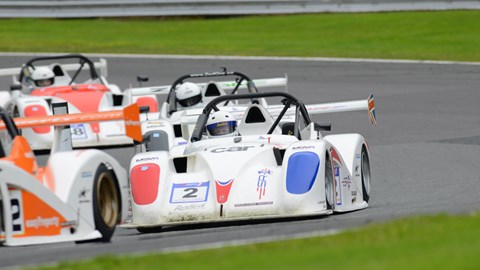
Adding to my distraction, I spot Oliver Barker in my mirrors, now in second place. He’s embarked on an impressive charge from the back of the grid, and making rainy hay when the mid-race safety car concertinas the field, he’s closed down and passed all in front of him. Crossing the stripe, Tom’s pitboard reads two minutes remaining. A wet lap around Oulton takes roughly two minutes, so I reason this must be the last lap. After such an eventful race, my nerves are fraying and I just need to hang on. Oliver’s getting closer, the track feels slippier, but I manage to muddle round and keep the gap to the line. There’s no chequered flag. Tom’s board reads 0 minutes. We’ve got to go round again.
And the inevitable happens. Coming into Hislops’s chicane, I brake on the slippery left hand side of the track rather than the right I used in qualifying; the car slews as the tyres begin to lock and it’s clear I’m not going to make the corner. I don’t want to use the escape road, as I reason I would have gained an advantage and would probably have to give the position back to Oli, so I turn in on the grass and just make it into the corner. Then there’s a thump in the side of my car as Barker’s SR1 appears from stage right outside of my peripheral vision, and he’s through, with half a lap to go. I get close enough to try and pass him again but the track is too narrow, his car’s too wide, and all I can do is watch him cross the line ahead of me. Hats off to Oliver, who is rightly jubilant after taking the win from the very back of the grid. I still have to watch the last lap through my fingers, but it’s a fantastic race and sums up everything the SR1 Cup is about.

By the time Race 2 arrives, the track really is very wet. This time I go when the lights do, but make a hash of it and again get swamped. Déjà vu. I fight back to second and catch Kye Wheatley, showing further impressive car control in the lead. I close the gap to him but I’m wrestling with a car that spends all of its time wanting to go sideways no matter how smoothly I try to make my inputs. Kye appears to be having just as much difficulty as me, embarking on some real adventures in some of the braking zones.
The race ends with Kye first, me second, and Oliver Barker third after another impressive drive from the back. I should feel elated on the drive home to return safely with two second places, but I can’t help but kick myself for the errors I’ve made. But you need to make mistakes to learn, and learning is what the SR1 Cup is all about learning. It’s an incredible classroom to learn in, and even more incredibly, I’m still leading the championship at its halfway point.
Next stop: Cadwell Park.
By James Taylor
Photos by Oliver Read
You can watch Race 2 from Oulton Park in its entirety with commentary in the official video below:
Radical SR1 Cup 2016 race diary – July: what’s it like doing a trackday in the Radical SR1?
Oulton Park’s next up on the bill for Round 2 of the SR1 Cup, and since I’ve never driven the circuit before (except experiencing a couple of laps in the passenger seat of our old Ginetta long-termer), Radical very kindly arranged for me to learn the circuit at a public trackday.
Radical positively encourages SR1 customers to use their cars as much as possible, including enjoying them at trackdays. Problem is, the car’s almost too good for that purpose; it was so much quicker than everything else at Oulton that day – Caterhams, McLarens, Clio Cup cars, you name it – that the only cars that could hold a candle to the SR1’s pace were other Radicals.
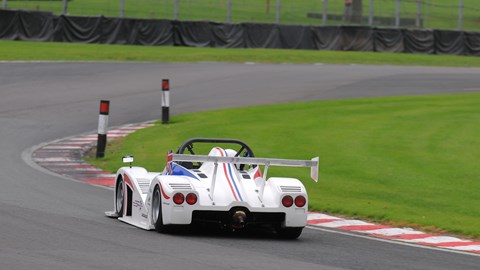
Clearing the traffic is a case of cruising up behind someone, making sure they’ve spotted you (the SR1 doesn’t come up to the bootlid of most cars, and you catch them so fast…) and then waiting for them to allow you through. (For safety, overtaking at trackdays is allowed only on the left, on straights, and by a signal from the car in front. Race test days can be a bit of a culture shock by contrast , where passing is allowed to occur any place, any time – and does.) So you spend a fair bit of time queuing, as if on a particularly surreal commute. Getting a full clear lap is rare, so you learn individual corners as and when they’re free. It’s amazing to think that some customers have bought the fastest car Radical makes, the V8-engined, Nurburgring record-holding SR8, as a trackday car. They must have the patience of (very fast) saints.
Be in no doubt, though, a trackday in an SR1 is a wonderful experience, especially on a circuit as demanding and exciting as Oulton Park. It’s also a great confidence boost – if you want to feel like a hero, turn up at a trackday in an SR1. You’re highly unlikely to get overtaken. Unless there’s another Radical there…
By James Taylor
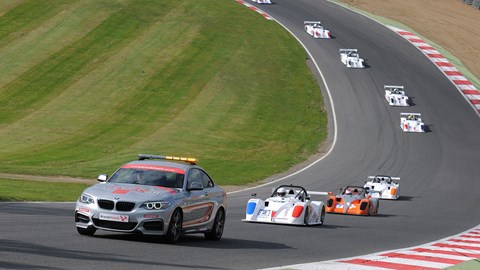
Radical SR1 Cup 2016 race diary – May: our first race at Brands Hatch
Don’t stall. Please, please, don’t stall. This is a big moment, for me and our long-term race car. Together we’re about to start the first race of the Radical SR1 Cup season on a beautiful sunlit day at Brands Hatch, and, unbelievably, we’re doing it from the front row. As a marshal dangles the five seconds to go board over the pitwall, I’m deep in the throes of paranoia. During the championship’s pre-season practice days, Radical arranged dress-rehearsal race starts, so we’d be prepared for this exact moment… and I stalled almost every time. Just as I did a moment ago on the way to the formation area. I haven’t been this nervous about pulling away since my driving test. Did I mention the Brands grid is on a hill, by the way?
But I’m getting ahead of myself. The day dawns bright and early with the drivers’ briefing, ahead of a mid-morning qualifying slot. All the race meetings in the SR1 Cup are compacted into a day, to cut down on the time commitment asked of competitors over the season, so it’s a packed schedule: quali in the morning, and two 20-minute races in the afternoon.
Qualifying is exciting and nerve-wracking in equal measure. For the first time, I’m driving the SR1 on a brand-new set of tyres, and since we’re limited to two sets for the season, I need to look after them and keep them fresh for the races, while still going quickly. A tricky balance. Now I know why modern-era F1 drivers moan so much. I bed them in gently before pushing as hard as I dare, and as I pull into parc ferme there’s an encouragingly broad smile on our mechanic Tom’s face – turns out I’ve qualified second, a tenth of a second behind fellow first-time SR1 driver Oliver Barker. Hearteningly, I’m told that both Barker and I have qualified faster than the existing SR1 lap record, which bodes well. If I can actually get the thing off the line.
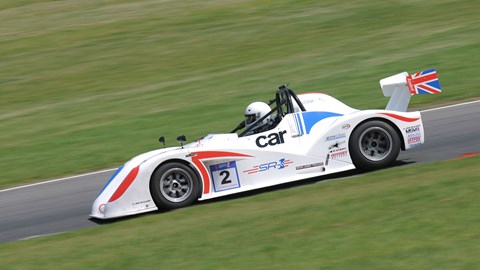
Oh heck. The red lights are on now. I hold the revs orbit-high (it’s a ’bike engine, after all) bring the (also bike-derived) clutch up gently, and – it’s a great start! I’m the first driver to lead a lap in the 2016 SR1 Cup.
It’s horrible. Barker’s glued to the back of my car like he’s hitched to a tow bar, and I can’t relax for fear of putting a wheel wrong and leaving an SR1-sized gap. This is going to be a very long 20 minutes. Respite comes in the shape of a mid-race safety car. Time to breathe, and try not to fluff the restart. Which, annoyingly, I do – as the pace car peels off, I expect it to be going just a little bit quicker than it actually is, and very nearly overtake it as it enters the pits. I have to back off, and now Barker really is right on me. A few laps later he gets a run on me down the pit straight, and we go through the precipitous Paddock Hill bend joined at the hip quite literally inches apart, me clinging on around the outside.
We arrive at the slippery Druids hairpin together, and, almost in slow motion, Barker’s car spins beside me under braking, smoke wisping from its rear Dunlops. I scoot around the outside and manage to avoid clipping him. We’re clear. Got this in the bag now: time to back off and look after the tyres for next time. But before I know it Barker’s back again – turns out that in a move a stunt driver would have been proud of, he looped the car straight again and lost only lost two seconds in the spin. As I foolishly drop my pace to a cruise I see him loom in my mirrors once again. Then there’s a red flag; a car is stranded on the circuit, and the race is over.
If you could bottle this feeling. Nothing that happens in the next few hours, days or weeks could matter. I’m drunk on the kind of happiness that you hardly dare believe could be real. And the best thing is, we get to do it all again only a couple of hours later. You can watch Race 1 in full on the Radical TV YouTube channel below:
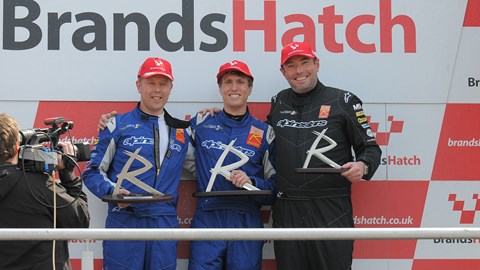
The grid for the second race is decided by each driver’s time second-fastest time from the qualifying session, so this time, excitingly, we’re starting from pole. Hold the revs, bring the clutch up and… so nearly a stall. The revs bog down, ‘journalist causes startline pile-up’ headlines flash through my head, and the SR1 limps off the line, just.
Next to me, Barker’s done almost exactly the same thing, and we’re swallowed up by the pack behind. I’m sixth into the first corner, but the gaps open up in the right places on the first lap and I’m P2 as we cross the stripe. Kye Wheatley, in his second season in the SR1 Cup, is leading and I manage to catch up and shadow him for a few laps. As the laps tick past mid-race distance, we catch a back marker on the start-finish straight. Wheatley goes left, I go right, we’re three abreast next to the pit wall, and I’m on the inside for Paddock Hill. I’m through. It feels just like we’re Hakkinen and Schumacher passing either side of Zonta at Spa in 2000. In my head, anyway.
My daydreaming’s cut short by another safety car, but I make a better job of the restart this time, and hold the lead to the flag. Wheatley has his hands full with the recovering Barker, and just pips him to the line. The sense of elation is just the same the second time around, and it’s beaming smiles all around at Radical, especially from Tom, the no.1 mechanic on my car – it’s his first SR1 round win too.
You can watch Race 2 in full below.
Several weeks have passed since Brands, but I’m still on a high. Next stop for the SR1 Cup is the challenging, undulating Oulton Park circuit in Cheshire – more on which soon.
By James Taylor
Race photography in the galleries by Oliver Read
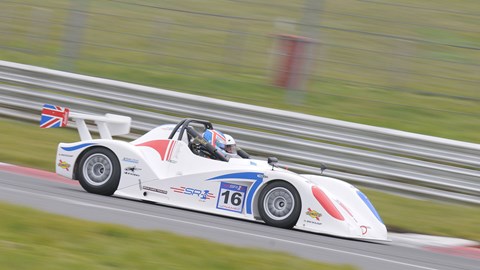
Radical SR1 Cup 2016 race diary – March: driving the car for the first time
Each SR1 Cup season starts with a series of official pre-season test days included in the championship package, to give drivers a chance to get to grips with their new cars, get to know one another and ask as many questions as possible of the championship organisers so they can hit the ground running when the season kicks off in earnest in May.
So, at a bracingly chilly Brands Hatch, we’re about to get our first taste of how our long-term racing car feels to drive. Inside the SR1 you sit in a laid-back driving position, in a kind of moulded plastic trough; strategic use of foam and tape is your best bet to avoid a bruised back. Ahead of you is a tiny steering wheel, which in our car includes a pair of gearshift paddles. You use the clutch pedal to pull away, and after that two pedals are all you need, with space to left-foot brake if you’re so inclined. The cockpit feels every inch the Le Mans racer; you could easily be in a Joest Porsche or a Gulf Mirage prototype. It’s a great place just to sit and daydream. But it’s more fun still on the move.
Radical also provides instructors to help SR1 drivers get up to speed, including none other than Le Mans winner Andy Wallace, national racing legend Ian Flux and SR3 front-runner Tom Ashton. For our first few laps in the car, Ashton jumps into the driving seat to show me the best way around Brands Hatch’s Indy circuit (open the steering early at Paddock, take a diagonal line into Druids, turn in late to Surtees). There’s a little bit more space in the SR1’s cockpit than you might imagine, given the penny-slot-car-outside-a-supermarket dimensions, but it’s still pretty tight with two of us on board. The foam pads on the rollbar supports are essential to prevent you bashing your head. You quickly learn to do your crash helmet’s strap up tight, too, as the airflow pushes it back onto your nose. Didn’t experience that in our windscreen’d Ginetta long-termer…
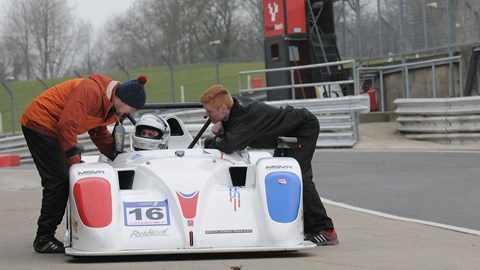
With Ashton’s encouragement I start gently upping the pace as the laps tick by. It’s fantastic fun. The SR1 is incredibly tail-happy, but ironically that actually makes it less intimidating to drive. In some grippier cars you’re in a permanent state of tension, waiting for the grip to snap away suddenly. The SR1 is the opposite, losing grip early and always sliding but doing so in a reassuringly predictable way. You don’t need much lock to catch a slide, and the treaded Dunlop tyres add to the predictability, as does the lack of a diffuser. Constantly adjusting the wheel while cornering, it’s almost as I’d imagine a historic racing car must feel.
Some years ago I raced a 100cc two-stroke kart and no car I’ve been fortunate enough to drive since – Lamborghini, McLaren – has felt fast in the same way. But the Radical does. In many ways it feels more akin to driving a kart than a car; same super-fast steering, same ultra-low driving position, same lack of body movement. It even sounds like my old 100cc kart too – the screaming 1500cc Hayabusa engine bolted into the chassis vibrates like crazy, and has fantastic throttle response. A lot of people change up too early when they first drive the car, Ashton tells us. Understandably – peak power is at 9000rpm, and it revs past 10…
I’ve been fortunate to drive some very special cars in this line of work, but the SR1 is easily the most fun. And that’s on a test day; next time I report back, it’ll be on racing the car for real…
By James Taylor
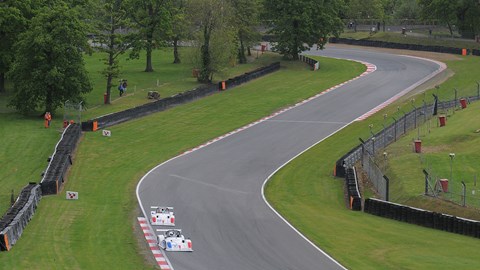
Second report running a Radical SR1: What exactly is the Radical SR1 Cup championship?
It’s a one-make championship designed for drivers new to motorsport, whether they’re a trackday regular or someone who has never driven on a circuit before.
The SR1 itself comes as the biggest bit in a package that also includes:
- An ARDS race licence test
- Radical racesuit (a different colour every year, incidentally. Blue is in this season)
- Two pre-season practice days to acclimatise to the car, with driver tuition
- Race entries in the eight-race SR1 Cup championship (two races per meeting at four circuits)
- Set-up tuition if you want it, at the track or at Radical’s factory
- The car (to keep, obviously)
The package as a whole costs £45,000. Not cheap, but as cheap as an organised high-speed sports prototype-style racing championship package can be.
In some aspects it’s a similar template to certain other first-step-into-racing, keep-the-car-at-the-end series like the Ginetta Racing Drivers Club and Caterham Academy – but the SR1 Cup is an awful lot faster. Drivers can expect to experience 2.3g in corners driving SR1s, up to 1.8g when braking, and the Radicals routinely lap circuits far quicker than many series further up the professional motorsport ladder – so it’s the fastest novice racing championship there is.
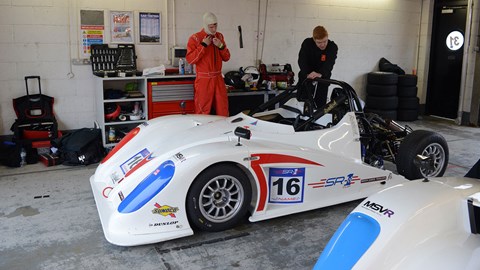
The car
The knee-high SR1 is Peterborough-based track and race car manufacturer Radical’s entry-level model. And as base models go, it’s quite serious. It looks (and goes) like a miniature Le Mans prototype, weighs less than 500kg sopping wet, is powered by a high-revving Suzuki Hayabusa-sourced motorcycle engine and can lap many of the UK’s circuits within a whisker of BTCC pace. Unlike some rookie racing cars, the SR1 definitely isn’t road-legal. It has brake and foglights, but no headlights, and the front splitter isn’t particularly speedbump-friendly…
Engine
Suzuki’s 1340cc Hayabusa ’bike engine with minimal changes. It’s actually set with a slightly lower rev limit in the Radical for a longer life; around 60 hours of hard use before a refresh.
Radical’s in-house RPE (Radical Performance Engines) division upsizes the same engine to 1.5 litres in the bigger, faster SR3 model, and equips it with a dry sump. And if you want to go really fast, the company also makes its own V8 engine, which conjoins two Hyabusa blocks to a common crank, for the Nordschleife record-breaking SR8.
The SR1’s engine is dyno’d, run in and warrantied at the Radical factory by the time the customer takes the car, and each engine is sealed to prevent any nefarious tuning – each car should be identical.
Gearbox
The standard six-speed unit from the Suzuki. As standard, you shift gears using a push-pull sequential lever, but our car’s fitted with the optional electro-pneumatic paddleshift gearbox for flat upshifts and clutchless, auto-blipped downshifts. It’s a popular option on many new SR1s, though a pricey one at nearly £4k.
Like a bike (or a kart), the SR1 drives its rear wheels via a chain, linked to a limited-slip diff. That incorporates a reverse gear unit – pull a lever in the cockpit and in theory you could use all six gears backwards. Could be a fun thing to try on an empty airfield…
Bodywork
Fibreglass. There’s no rear diffuser or other underbody aero, for two reasons – cost (to put the parts on the car, and replace them when they’re damaged), and to level the learning curve. Getting to grips with downforce is something of a black art, and the less of it the SR1 has, the easier it is to learn to drive quickly.
Tyres
Treaded racing tyres, developed by Dunlop specifically for the SR1. You race on the same tyres, whether the weather’s wet or dry. That’s not only to save costs, but also to make the handling more predictable – the whims and traits of slick tyres can be notoriously difficult to get used to; treaded tyres less so.
Competitors are limited to two sets for the season (or eight tyres in total), again to keep costs down, so tyre management plays an important role over the course of a season. They’re easy to wear out.
Radical SR1: tech spec
Engine RPE-Suzuki 1340cc 16v 4-cyl, 185bhp @ 9200rpm, 108lb ft @ 7000rpm
Chassis Tubular steel spaceframe
Suspension Double wishbone front and rear
Gearbox Six-speed sequential with chain drive, separate reverse unit and limited-slip differential, rear-wheel drive
Performance stats 0-60mph 3.6sec, 50-100mph 6.1sec, 138mph
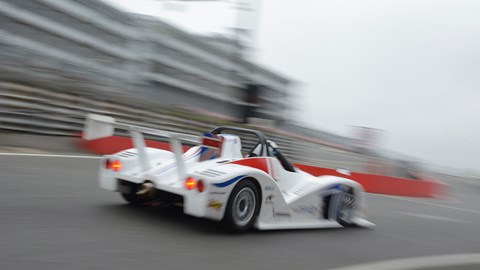
How does the championship work?
A 20-minute qualifying session sets the grid for two 20min races at each round. Qualifying and both races take place on one day, to minimise the commitment required for competitors new to the sport.
For the same reason, the championship season is limited to four rounds. It deliberately starts comparatively late in the year, to give customers as much time as possible to prepare and acclimatise to the car. Radical holds two pre-season practice days to get everyone up to speed, practice a race start on the grid and get to know all the other competitors and teams.
Who can enter?
Anyone, although experienced racing drivers aren’t allowed – when you start your first season in SR1s, you must be classified as a novice by the MSA (which generally means competing in fewer than six races). I’ve done two race weekends before – one at Donington Park after winning the want2race competition in 2014, and one in our long-term Ginetta G40 at Silverstone in 2015, so I still qualify.
Drivers can race in the SR1 Cup for two seasons – so they can use the first year to learn the ropes, gain experience and speed, and put all that hard-earned experience into play in year two. Championship co-ordinator Roger Green says the majority of mid-pack drivers in year one are often fighting for podiums in year two.
When your two seasons are up, you could race the same car in a class within the separate Radical Challenge series, where slick tyres and an engine upgrade are allowed, or trade it in against an SR3 and go even faster. Radical’s got this sussed.
Previous guest drivers in the SR1 Cup championship include track cycling legend Sir Chris Hoy, who competed in its inaugural 2013 season (and in 2016 made his debut in the Le Mans 24 hours), and Thrust SSC land speed record holder Andy Green in 2014. And now, erm, us.
Any extra costs?
Apart from the £37,500+VAT price for the car and championship package detailed above, you’ll probably want to go testing during the season (around £250 for an official Friday test day), you might want to have the car transported to the races on your behalf, perhaps a Radical data engineer for the weekend, maybe another set of tyres to test with, and many competitors pay for either the Radical factory team or an independent team to run them rather than go it alone as a privateer.
Motorsport is never cheap, though the SR1 Cup is certainly more cost-effective than most.
Before the SR1 Cup existed, the entry point to the high-speed world of Radical racing was the SR3, a larger, faster model that required more commitment financially (around £75k a car), and more commitment to drive too, with slick tyres and high levels of downforce.
Radical needed a stepping stone below the SR3 – a car that was more affordable to buy, and easier for a novice to get to grips with. So, in 2013, the Radical SR1 Cup was born. ‘Speaking to drivers at trackdays, we met many who’d always wanted to go racing but had never been able to do it,’ explains the SR1 Cup’s championship co-ordinator, Roger Green. ‘They frequently named three main reasons why not: money, time, and not knowing where or how to start. Plus the fact they might have to start racing against people who’ve been doing it all their lives. So we aimed to create a championship that knocks away all those barriers. There were 23 cars on the grid for the first year, and we haven’t changed the format, or the cars, since.’
Follow the 2016 Radical SR1 Cup season at www.radicalsportscars.com, and on track at:
Round 1: Brands Hatch Indy, 5 May
Round 2: Oulton Park, 16 June
Round 3: Cadwell Park, 3 September
Round 4: Snetterton, 9 October
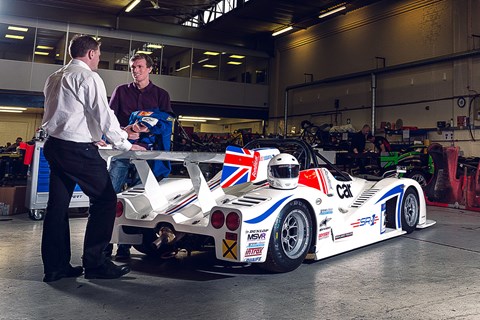
First report running a Radical SR1: our glorious racing summer
It looks like a scale-model Le Mans prototype, it sounds like a soprano banshee, and it’s the most exciting thing with four wheels I’ve ever driven. This is the Radical SR1, and for the 2016 season, it’s all ours.
Radical Sports Cars isn’t a household name, but more than 1900 cars have rolled out of the company’s Peterborough base since 1997, from lap record-eating racers to type-approved road(ish) cars. None of them have been dull. This particular one isn’t road legal; the SR1 is actually Radical’s entry-level model, sold as the biggest bit in a package designed for novice drivers taking their first steps in sports car racing. Together with the car you get your race licence test, racesuit, testing and tuition to get you up to speed, and entry into the four-round SR1 Cup championship. All-in, £45,000 – not cheap, but about as cost-effective as organised sports prototype racing can be.
And as ‘entry-level’ series go, none are faster. The SR1’s designed to a scarcely credible minimum race weight of 480kg (including the driver!), and drives its rear wheels with a stratospherically revvy 185bhp Suzuki Hayabusa engine. It runs on treaded Dunlop racing tyres rather than slicks (to enable drivers to run the same tyres rain or shine, and to bless the car with more predictable handling) but it can still corner at more than 2g. Maybe I should start training my neck muscles.
We took delivery at Radical’s HQ in Peterborough’s Westwood industrial park. Over the years it’s gradually grown to absorb many of its surrounding units, its 140 or so staff today split between several bustling buildings. The company’s precision machining division works almost around the clock, catering for all kinds of industries outside the motorsport world. Only 30% of the components manufactured in the machine shop end up in racing cars, the rest heading off to homes in medical equipment, the marine industry, large-scale drilling, you name it.
Next door, the in-house RPE engine-building arm stitches together Radical’s tiny yet mighty Frankenstein V8 engine from separate four-cylinder motorcycle heads, and tickles Ford Ecoboost V6s to 600bhp-plus for the flagship RXC Coupe. Our car makes do with a barely-tweaked Hayabusa unit – it’ll do.
The SR1 begins life on a jig as a welded assembly of square- and round-section steel tubes, built up into a strong spaceframe chassis with a collapsible aluminium crash structure at the front. That’s later enveloped in fibreglass bodywork, the fruit of around 40 man hours in Radical’s body workshop, kept busy all year round clothing new cars and repairing battle-scarred existing ones.
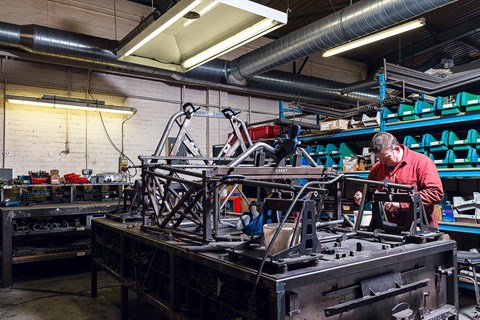
The production process culminates in the final assembly area, where the components required for each car are plucked from the adjacent ready-stocked parts shelves and lined up in a rack in the car’s bay – like a high-end motorsport engineering edition of supermarket sweep. We even ‘helped’ put a few SR1 components together ourselves (reassembled later by more skilful hands, no doubt). Radical builds around 25 SR1s a year (and 80 to 100 of its bigger, faster SR3 brother, the company’s core model). Production’s flexible according to demand, and can be very rapid when required; in the previous fortnight before we arrived, seven SR1s had been built and shipped off to a race school in the Middle East.
Even next to Radical’s other shrink-wrapped racing cars in the assembly area, the knee-high SR1 looks tiny, almost like a kart wearing fibreglass bodywork. And that’s how it feels to drive, too – in a good way. Super-fast steering, practically zero body roll and a complete aversion to understeer. No supercar can corner like an SR1 can. Radical provides two dedicated pre-season practice days for SR1 drivers to get to grips with everything before the season kicks off, and already I’m spellbound. It’s very tail-happy, but oddly that doesn’t make it intimidating to drive. The SR1’s always sliding, but doing so in such a predictable way that it’s always on your side.
That’s partly down to those treaded tyres (developed by Dunlop specifically for the car) and also the lack of any underbody aero. Despite that big rear wing, the SR1’s handling isn’t greatly influenced by downforce – another deliberate move to make the car as approachable as possible for first-time racers.
We’re in good company; past guest drivers in the SR1 Cup include World’s Fastest Man (TM) Andy Green and Sir Chris Hoy, who’ll shortly make his Le Mans debut. And now, erm, me. By the time you read this, we’ll have had our first race of the season at Brands Hatch. I’ll let you know how it went next time…
How we specified ours:
- Passenger seat belts: handy for driver coaching, or scaring your mates (£270)
- AiM SmartyCam video system: a valuable learning tool/gateway to YouTube infamy (£1343)
- Foam rollbar stay protectors: you’ll need these – the SR1 can corner at 2g+ (£67.45)
- Paddleshift gearchange: flat upshifts and auto-blip for clutchless downshifts (£3950)
Logbook: Radical SR1
Engine 1340cc 16v 4-cyl, 185bhp @ 9200rpm, 108lb ft @ 7000rpm
Transmission 6-speed sequential, chain drive, limited-slip diff, rwd
Stats 0-60mph 3.6sec, 50-100mph 6.1sec, 138mph, n/a CO2
Price £45,000 (inc race entries, race suit, licence test, practice days, tuition)
As tested £50,630
Miles this month 200
Total miles 200
Our mpg n/a
Official mpg n/a
Fuel this month n/a
Extra costs £0
By James Taylor
Read more CAR long-term tests here